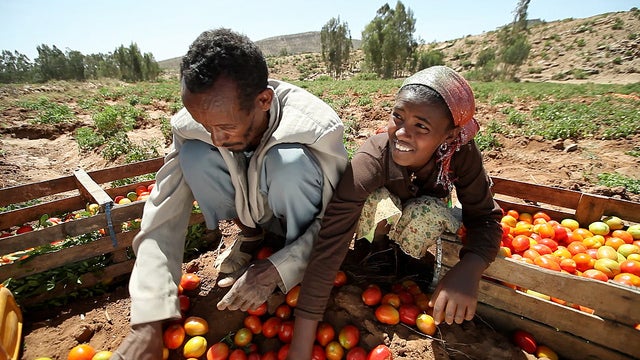
Photo Credit: Stephan Bachenheimer / The World Bank
Women today represent about 50 percent of the world’s population and, for the past two decades, about 50 percent of the labor force. Yet there are stark differences in the outcomes they achieve: Women are only half as likely as men to have a full-time wage-earning job. The women who do have paid jobs earn as much as one-third less than men. Fewer women than men are involved in trade or own registered companies. And women are more likely to work in low-productivity activities or informal employment.
There are many reasons for these outcomes, including socio-cultural norms, access to high-quality jobs, the lack of transport and the lack of child-care facilities. In many countries, such differences also continue to be written in the law.
For the first time since it was launched in 2002, the World Bank Group’s annual Doing Business report this year added a gender dimension to its measures, including to the annual ranking on each country's ease of doing business. This is good news, since the report attracts the attention of policymakers worldwide. Global benchmarks and indicators are a powerful tool to raise awareness, motivate policy dialogue and, above all, inspire action by policymakers.
Ensuring that women have the same economic opportunities by law and in practice is not only a basic human right, it makes economic sense. A recent study estimates that achieving equality in economic opportunities for women and men could spur $28 trillion in world GDP growth by 2025 – about the equivalent of the size of the Chinese and U.S. economies combined.
Looking at gender differences when it comes to starting a business, registering property or enforcing contracts, Doing Business shows that 23 countries impose more procedures for women than men to start a business. Sixteen countries limit women’s ability to own, use and transfer property. And in 17 economies, the civil courts do not value a woman’s testimony the same way as a man’s.
This pattern might give the impression that such legal differences are really only an issue in a selected group of countries. But Doing Business’ sister publication – Women, Business and the Law – tells us otherwise. The report analyzes gender parity in accessing institutions, using property, getting a job, providing incentives to work, building credit, going to court and, most recently, protecting women from violence. It finds that 90 percent of the 173 countries measured have at least one law impeding women’s economic opportunities. In 30 economies, there are 10 or more legal differences between men and women, predominantly across the Middle East and North Africa.
To counter this, there is ample evidence that those countries that have integrated women more rapidly into the workforce have improved their international competitiveness by developing export-oriented manufacturing industries that tend to favor the employment of women. Legal gender disparities are also associated with lower female school enrollment and labor-force participation.
There is some good news. The Women, Business and the Law 2016 report shows that, between 2013 and 2015, 65 economies made 94 reforms increasing gender parity. The World Bank Group’s Trade & Competitiveness Global Practice (T&C) – a joint practice of the World Bank and the International Finance Corporation (IFC) – works across the world to support governments as they design gender-informed and gender-neutral policies, and in many cases implement gender-targeted interventions to improve the business environment and expand market opportunities for women.
Our teams work on conducting value-chain analysis in targeted sectors, addressing regulatory implementation gaps for women in business, improving incentives for women entrepreneurs and skills for female labor-force participants, and addressing wage gaps. There are currently 194 T&C projects that address gender issues in some form. They are mostly concentrated in the Sub-Saharan Africa and Europe and Central Asia regions, but they span across all regions of the world. To add to the body of research in this field, there are 15 impact evaluations now underway – projects aimed at assessing the impact of development interventions – of new and existing gender-focused initiatives that are being implemented in partnership with the Bank’s Gender Innovation Lab and development partners. The results will serve to better base future engagements on evidence.
In several countries, our teams are working to build the capacity of women-led small and medium-sized enterprises (SMEs) and women entrepreneurs through the Women Innovators Network in the Caribbean and through womenX in Pakistan, Nigeria, Togo and Uganda. In Pakistan, T&C is working to reduce gender-biased implementation of regulations. Our support has also had some exciting results in West Africa in the past few years. In Cote d'Ivoire, we supported changes to the head-of-household provision. Togo followed, also implementing amendments to the Family Code, which now allows women to receive the tax designation “head of household” and to inherit their husband’s property. The reform also prohibits discriminatory customary law. The reform will have substantial impact in women’s decision-making capacity, their ownership and control of assets (including land), and their realization of more and better jobs – all of which would strengthen Togo's business environment. In Sierra Leone, T&C is working to increase awareness and dialogue around discriminatory legal provisions, particularly in the mining sector.
Raising awareness and changing mindsets on the importance of gender parity is just as important as supporting legal changes. With Doing Business now highlighting female participation, we are hopeful that this will help raise the profile of this important issue on policymakers’ agendas.


Join the Conversation